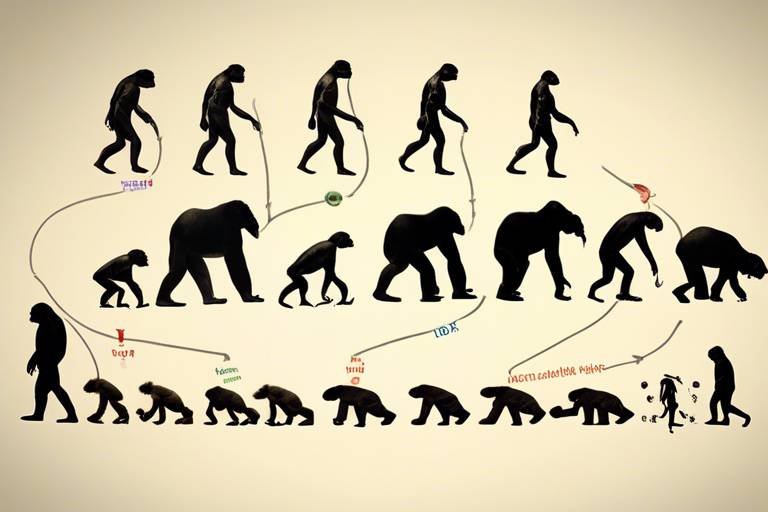The Logical Positivism Movement and its Impact on Science
The Logical Positivism Movement emerged as a revolutionary philosophical approach in the early 20th century, fundamentally altering how we perceive science and knowledge. At its core, logical positivism sought to establish a clear demarcation between meaningful statements and those that are not, advocating for a rigorous, empirical basis for knowledge. This movement was not just an academic exercise; it was a clarion call for clarity and precision in an age rife with abstract speculation and metaphysical musings. By emphasizing the importance of empirical verification and logical reasoning, logical positivism laid the groundwork for modern scientific inquiry, influencing countless disciplines and shaping the way we understand the universe.
Imagine walking into a crowded room filled with people debating the meaning of life. Some are discussing lofty ideals, while others are arguing about the practicalities of existence. In the midst of this chaos, logical positivism acts like a spotlight, illuminating the path toward clarity. It challenges us to ask: What can we truly know? The answer, according to logical positivists, lies in what can be observed and tested. This philosophy encourages scientists and thinkers alike to focus on what can be empirically verified, steering clear of ambiguous statements that lack practical significance.
The impact of logical positivism extends beyond mere academic philosophy; it has reshaped the very fabric of scientific methodology. By promoting a framework where knowledge is grounded in observable phenomena, logical positivism has become a cornerstone of scientific practice. This movement has encouraged scientists to adopt a more rigorous methodology, emphasizing the necessity of falsifiability and empirical testing. In a world where theories can be proposed and dismissed based on evidence, the logical positivist approach ensures that science remains a dynamic and self-correcting endeavor.
However, the journey of logical positivism is not without its challenges. Throughout its evolution, it has faced critiques from various philosophical movements, including existentialism and post-positivism. These critiques often question the assumptions underlying logical positivism, particularly regarding the nature of language and the limits of empirical knowledge. Nevertheless, the legacy of logical positivism endures, as it continues to provoke thought and inspire debate in both philosophical and scientific circles.
In summary, the logical positivism movement has profoundly influenced our understanding of science and knowledge. It has encouraged a shift towards empirical evidence and logical reasoning, fostering a culture of inquiry that remains relevant today. As we continue to explore the mysteries of the universe, the principles of logical positivism will undoubtedly play a crucial role in shaping our scientific endeavors.
- What is logical positivism?
Logical positivism is a philosophical movement that asserts that a statement is only meaningful if it can be empirically verified or is tautological. - Who were the key figures in the logical positivism movement?
Key figures include members of the Vienna Circle, notably Rudolf Carnap and Ludwig Wittgenstein, who made significant contributions to the philosophy of science and language. - How did logical positivism impact scientific methodology?
It emphasized the need for falsifiability and empirical testing in formulating scientific theories, promoting a rigorous approach to scientific inquiry. - What are some critiques of logical positivism?
Critiques often focus on its implications for metaphysics and ethical statements, questioning whether all meaningful propositions can be empirically verified.

The Origins of Logical Positivism
The origins of logical positivism can be traced back to the early 20th century, a period marked by profound philosophical shifts and scientific advancements. This movement emerged primarily from the Vienna Circle, a group of philosophers and scientists who sought to address the challenges posed by traditional metaphysics and the limitations of language. Their goal was to create a philosophy that was rooted in empirical science and logical reasoning, distancing themselves from the speculative nature of previous philosophical thought.
At the heart of this movement was a reaction against the abstract and often ambiguous nature of earlier philosophical traditions. The logical positivists believed that many philosophical problems arose from misunderstandings of language and the misuse of concepts. They argued that for a statement to be meaningful, it must be either empirically verifiable or a tautology. This marked a significant departure from the philosophies of the past, which often delved into metaphysical inquiries that could not be substantiated by empirical evidence.
The historical context of the time played a crucial role in shaping logical positivism. The aftermath of World War I led to a crisis in traditional values and beliefs, prompting thinkers to seek a more scientific and rational approach to understanding the world. The rise of the natural sciences, particularly physics, provided a model for how knowledge could be constructed through observation and experimentation. This shift laid the groundwork for the logical positivists to advocate for a philosophy that mirrored the rigor and precision of scientific inquiry.
Key figures in this movement, such as Moritz Schlick, the founding member of the Vienna Circle, and Rudolf Carnap, emphasized the importance of logical analysis in clarifying philosophical problems. Their work sought to establish a framework that would allow for the rigorous examination of language and meaning. They believed that by applying the principles of logic to philosophical questions, they could eliminate ambiguity and confusion, leading to clearer and more meaningful discussions.
As logical positivism gained traction, it also drew upon the ideas of earlier philosophers, including David Hume and Immanuel Kant. Hume's skepticism about causation and Kant's emphasis on the limits of human knowledge influenced the logical positivists' views on the relationship between language, knowledge, and reality. The logical positivists aimed to refine these ideas, creating a more systematic approach to understanding the nature of knowledge itself.
In summary, the origins of logical positivism were deeply intertwined with the historical, scientific, and philosophical currents of the early 20th century. It represented a bold attempt to redefine philosophy in a way that emphasized clarity, empirical verification, and logical consistency. This movement not only reshaped the landscape of philosophy but also had a profound impact on the development of scientific methodologies, which we will explore further in the following sections.

Key Figures in the Movement
The logical positivism movement was not just a solitary endeavor; it was a vibrant tapestry woven from the thoughts and ideas of several brilliant minds. At the heart of this philosophical revolution were the members of the Vienna Circle, a group of philosophers and scientists who sought to redefine the landscape of philosophy and science. Their collective goal was to establish a framework that emphasized empirical verification and logical reasoning, steering philosophy away from metaphysical speculation. Among these influential figures, a few stand out for their profound contributions and lasting impact on the philosophy of science.
Rudolf Carnap was undoubtedly one of the most prominent figures in the logical positivism movement. His work laid the groundwork for many of the principles that would come to define the movement. Carnap championed the idea that philosophy should be grounded in scientific methodology, advocating for a rigorous approach to the analysis of language. He believed that by clarifying language, one could eliminate philosophical confusion and focus on genuine questions of knowledge. His seminal texts, including The Logical Structure of the World and Meaning and Necessity, emphasized the importance of logical analysis, making him a cornerstone of logical positivism.
Another key figure was Ludwig Wittgenstein, whose early philosophical work significantly shaped the trajectory of logical positivism. In his influential book, Tractatus Logico-Philosophicus, Wittgenstein explored the relationship between language and reality, proposing that the structure of language mirrors the structure of the world. This idea resonated deeply with the logical positivists, who sought to ground their philosophy in linguistic clarity. Wittgenstein's assertion that "the limits of my language mean the limits of my world" became a rallying cry for those in the movement, emphasizing how language shapes our understanding of reality.
The Vienna Circle was also home to other notable thinkers, including Moritz Schlick, the founding member, who played a crucial role in popularizing the principles of logical positivism. His emphasis on the verification principle and the importance of empirical evidence in science was pivotal in shaping the movement’s direction. Additionally, Hans Reichenbach contributed significantly to the discussions around probability and scientific inference, further enriching the philosophical discourse of the time.
In summary, the key figures of the logical positivism movement, including Carnap, Wittgenstein, Schlick, and Reichenbach, collectively forged a new path in the philosophy of science. Their dedication to empirical verification and logical clarity not only transformed philosophical inquiry but also laid the groundwork for modern scientific methodologies. Their legacy continues to influence contemporary debates in philosophy and science, proving that the quest for knowledge is a collaborative journey.
- What is logical positivism? - Logical positivism is a philosophical movement that emerged in the early 20th century, emphasizing the verification principle, which states that a statement is meaningful only if it can be empirically verified or is tautological.
- Who were the main figures of logical positivism? - Key figures include Rudolf Carnap, Ludwig Wittgenstein, Moritz Schlick, and Hans Reichenbach, among others, who contributed significantly to the movement's principles and ideas.
- How did logical positivism impact science? - Logical positivism promoted empirical evidence and logical reasoning as the foundation of scientific inquiry, influencing the development of rigorous scientific methodologies.

Rudolf Carnap's Contributions
Rudolf Carnap was a towering figure in the logical positivism movement, and his contributions are nothing short of revolutionary. Born in 1891 in Germany, Carnap’s intellectual journey took him through the turbulent waters of early 20th-century philosophy, where he emerged as a champion of scientific rigor and clarity in language. His work fundamentally reshaped how we approach philosophy, particularly in the realms of science and logic. One of his most significant contributions was the advocacy for a scientific approach to philosophy, which he believed should be grounded in empirical evidence and logical analysis.
At the heart of Carnap's philosophy is the idea that much of traditional philosophy is muddled by ambiguous language. He argued that to communicate effectively, we must clarify our terms and the logical structure of our arguments. This emphasis on clarity led him to develop various formal languages, which allowed for precise expression of scientific and philosophical ideas. He believed that by using these formal languages, we could eliminate confusion and focus on what truly matters: the verification of statements through empirical evidence.
One of his hallmark ideas is encapsulated in the Principle of Verification. This principle posits that a statement is only meaningful if it can be empirically verified or is tautological (i.e., true by definition). For instance, a statement like "The cat is on the mat" can be tested and observed, whereas a metaphysical claim such as "God exists" lacks empirical verification and is thus considered meaningless in Carnap's framework. This principle was not just a philosophical stance; it was a call to arms for scientists and philosophers alike to ground their inquiries in observable phenomena.
However, it’s important to note that Carnap’s ideas didn’t exist in a vacuum. They were part of a broader intellectual movement, and he often engaged with other prominent figures of the Vienna Circle, such as Moritz Schlick and Otto Neurath. Together, they sought to establish a new philosophy that would align closely with the scientific method, promoting a worldview where science and philosophy could collaborate to uncover truths about the universe.
Despite the clarity that Carnap sought to instill in philosophical discourse, his principle of verification faced significant critiques. Detractors argued that it could dismiss meaningful discussions in ethics, aesthetics, and metaphysics—areas that many believe are essential to human experience. This led to further philosophical debates about the limits of language and the nature of meaning, positioning Carnap at the center of a vibrant and contentious intellectual landscape.
In summary, Rudolf Carnap's contributions to logical positivism were pivotal in shaping modern philosophy and the philosophy of science. His insistence on clarity, empirical verification, and logical structure continues to resonate in contemporary discussions, reminding us that the pursuit of knowledge must be both rigorous and accessible. His legacy is a testament to the power of language and logic in our quest to understand the world around us.
- What is logical positivism? Logical positivism is a philosophical movement that asserts that knowledge is primarily derived from empirical evidence and logical reasoning.
- Who was Rudolf Carnap? Rudolf Carnap was a key figure in the logical positivism movement, known for his work on the philosophy of language and the principle of verification.
- What is the principle of verification? The principle of verification states that a statement is meaningful only if it can be empirically verified or is tautological.
- What critiques did Carnap face? Carnap faced critiques regarding the implications of his principle of verification, particularly its dismissal of metaphysical and ethical statements as meaningless.

The Principle of Verification
The principle of verification stands as a cornerstone of logical positivism, proposing that the meaning of a statement is intrinsically linked to its method of verification. In simpler terms, a statement is only deemed meaningful if it can be empirically verified through observation or experimentation, or if it is a tautology—essentially a statement that is true by definition. This principle revolutionized the landscape of philosophy and science by insisting that metaphysical claims, which cannot be tested or observed, lack cognitive significance. Imagine trying to describe a color to someone who is blind; without a shared frame of reference, the conversation becomes abstract and ultimately meaningless. Similarly, the principle of verification demands concrete evidence as the basis for meaningful discourse.
This principle emerged from the desire to eliminate the ambiguities and metaphysical speculations that had long plagued philosophical inquiry. Logical positivists, particularly those from the Vienna Circle, sought to establish a clear demarcation between science and non-science. They believed that by adhering strictly to empirical verification, one could sift through the noise of unverifiable claims and focus on what could be demonstrated and tested. For example, consider the statement "All swans are white." According to the principle of verification, this claim holds meaning only if one can observe swans and confirm their color. However, if someone were to claim, "There are swans that are not white," the verification of this statement would require empirical evidence, challenging the original assertion.
To illustrate the application of the principle, consider the following table that contrasts meaningful statements with those that are not verifiable:
| Statement | Meaningfulness |
|---|---|
| The sky is blue. | Meaningful (empirically verifiable) |
| God exists. | Not meaningful (non-empirical) |
| All bachelors are unmarried. | Meaningful (tautological) |
| There are universes beyond our own. | Not meaningful (non-empirical) |
While the principle of verification provided a robust framework for distinguishing between meaningful and meaningless statements, it was not without its challenges. Critics argued that this principle itself could not be empirically verified, leading to a paradox. How could a principle that seeks to define meaning be considered meaningful if it does not adhere to its own standards? This critique opened up a Pandora's box of philosophical debates, questioning the very foundations upon which logical positivism was built.
Moreover, the implications of the principle extended beyond mere semantics. It raised significant questions about the nature of ethical statements and metaphysical claims. For instance, when someone asserts, "Murder is wrong," can this statement be verified in the same way as a scientific hypothesis? The logical positivists would argue that ethical statements lack empirical content, thus rendering them meaningless under the principle of verification. This perspective sparked a myriad of discussions among philosophers, leading to the rise of alternative frameworks that sought to address these limitations.
In conclusion, the principle of verification not only shaped the discourse of logical positivism but also ignited philosophical debates that continue to resonate today. It challenged thinkers to reconsider the nature of meaning, knowledge, and the role of empirical evidence in understanding our world. Whether one agrees with its tenets or not, the principle remains a pivotal aspect of 20th-century thought, pushing the boundaries of how we define and engage with knowledge.

Critiques of the Principle
The principle of verification, while central to logical positivism, has not escaped scrutiny and critique. Many philosophers and thinkers have raised concerns about its implications, particularly regarding metaphysics and ethics. One of the fundamental arguments against the principle is that it appears to dismiss significant areas of human inquiry. For instance, how can we truly evaluate the meaning of ethical statements or metaphysical claims if they cannot be empirically verified? Critics argue that this stance creates a narrow view of knowledge, reducing complex human experiences to mere empirical observations.
Moreover, the principle has been criticized for its own self-referential dilemma. If we apply the verification principle to itself, we find that it cannot be empirically verified. This paradox leads to a significant philosophical problem: if the principle is not verifiable, is it itself meaningful? This question has sparked a plethora of debates among philosophers, raising doubts about the validity of logical positivism as a comprehensive philosophical framework.
Additionally, some critics have pointed out that the strict adherence to empirical verification can lead to an overly reductionist view of science and knowledge. By focusing solely on what can be observed and measured, we might overlook the importance of theoretical constructs that, while not directly observable, play a crucial role in scientific advancement. For example, consider the concept of gravity. While we can observe its effects, the theoretical underpinnings of gravity involve abstract notions that cannot be directly verified in the empirical sense. Thus, the critique highlights a potential limitation of logical positivism in accommodating the full scope of scientific inquiry and understanding.
In the realm of ethics, the principle of verification poses a significant challenge. Ethical statements often revolve around subjective experiences and values, which cannot be easily tested or verified. For instance, the statement "stealing is wrong" cannot be empirically validated in the same way one might validate a scientific hypothesis. This raises questions about the nature of moral truths and whether they can be meaningfully discussed within the confines of logical positivism.
Despite these critiques, proponents of logical positivism have attempted to defend the principle of verification by refining its application. They argue that while some statements may not be empirically verifiable, they can still hold meaning within specific contexts. This ongoing dialogue between supporters and critics of logical positivism has enriched philosophical discourse, leading to a deeper understanding of the complexities surrounding knowledge, language, and meaning.
- What is logical positivism?
Logical positivism is a philosophical movement that emphasizes empirical verification and logical analysis as the basis for meaningful statements, particularly in science. - Who were the key figures in logical positivism?
Key figures include members of the Vienna Circle, such as Rudolf Carnap and Moritz Schlick, who contributed significantly to the development of its principles. - What is the principle of verification?
The principle of verification states that a statement is only meaningful if it can be empirically verified or is tautological. - What are the critiques of the principle of verification?
Critiques include its dismissal of metaphysical and ethical statements, its self-referential dilemma, and its potential reductionist view of science.

Ludwig Wittgenstein's Influence
Ludwig Wittgenstein, a towering figure in 20th-century philosophy, left an indelible mark on the development of logical positivism. His early work, particularly the Tractatus Logico-Philosophicus, revolutionized the way philosophers approached the relationship between language and reality. In this groundbreaking text, Wittgenstein proposed that the structure of language mirrors the structure of reality, a concept that resonated deeply with the logical positivists. They embraced his idea that meaningful statements are those that can be either verified through empirical observation or are tautological in nature.
Wittgenstein's philosophy can be likened to a pair of glasses that helps us see the world more clearly. Just as a good pair of glasses sharpens our vision, his insights sharpened our understanding of language and its function in conveying meaning. He famously stated, "Whereof one cannot speak, thereof one must be silent," emphasizing that language has limits and that many philosophical problems arise from misunderstandings of language itself. This idea was pivotal for logical positivists, who sought to eliminate metaphysical claims that could not be empirically verified.
However, Wittgenstein's influence did not stop with the early works. His later philosophy, particularly in the Philosophical Investigations, introduced a more nuanced view of language, arguing that meaning is derived from the context and use of words rather than their inherent properties. This shift posed challenges to the strict verification principle upheld by logical positivists, as it suggested that language could be more flexible and multifaceted than they had previously acknowledged.
In the broader context of logical positivism, Wittgenstein's ideas prompted a reevaluation of the role of language in philosophy and science. His work encouraged philosophers to consider the practical applications of language in everyday life, rather than merely focusing on abstract principles. This evolution in thought led to a richer understanding of how language functions in various contexts, ultimately influencing the trajectory of 20th-century philosophy.
To summarize, Wittgenstein's contributions to logical positivism were twofold: he provided a robust framework for understanding the relationship between language and reality while also challenging the rigidity of the verification principle. His legacy continues to provoke thought and debate, illustrating the dynamic nature of philosophical inquiry.
- What is logical positivism?
Logical positivism is a philosophical movement that emerged in the early 20th century, emphasizing the importance of empirical verification and logical analysis in understanding knowledge and meaning.
- Who was Ludwig Wittgenstein?
Ludwig Wittgenstein was a prominent philosopher known for his work in logic, language, and the philosophy of mind. His ideas significantly influenced the logical positivism movement.
- What is the principle of verification?
The principle of verification asserts that a statement is meaningful only if it can be empirically verified or is tautological, which means it is true by definition.
- How did Wittgenstein influence logical positivism?
Wittgenstein's early work laid the groundwork for logical positivism by linking language to reality, while his later work challenged the movement's assumptions about meaning and language use.

Logical Positivism and Science
Logical positivism emerged as a revolutionary philosophy that fundamentally reshaped the landscape of scientific inquiry in the 20th century. It championed the idea that knowledge must be rooted in observable phenomena, thus promoting a rigorous approach to understanding the world around us. This movement argued that only statements verifiable through empirical observation or logical deduction hold meaning. Imagine a world where every claim about the universe is subjected to the same scrutiny as a scientific experiment; this was the vision of logical positivism.
The implications of this philosophy for science were profound. It encouraged scientists to adopt a more systematic methodology, focusing on empirical evidence and logical reasoning as the bedrock of knowledge. The logical positivists posited that scientific theories should not only explain phenomena but also be testable and falsifiable. This was a significant departure from earlier philosophical perspectives that often allowed for abstract reasoning without empirical backing. The mantra of "test it or discard it" became a guiding principle for many scientific disciplines.
In practice, this meant that scientists began to emphasize the importance of experimentation and observation over speculation. For instance, in fields like physics and biology, researchers were encouraged to develop hypotheses that could be rigorously tested against real-world data. The scientific method became more than just a set of steps; it transformed into a philosophy of inquiry that demanded accountability from scientific claims. This shift not only advanced scientific knowledge but also established a clearer demarcation between science and non-science.
Moreover, logical positivism's insistence on falsifiability as a criterion for scientific theories played a crucial role in the evolution of scientific thought. The idea that a theory must be structured in a way that allows for its potential refutation became a cornerstone of scientific progress. For example, the transition from Newtonian physics to Einstein's theory of relativity exemplifies this principle. Einstein's theories challenged existing notions and were subject to rigorous testing, which ultimately led to significant advancements in our understanding of space and time.
However, while logical positivism made substantial contributions to the scientific method, it was not without its challenges. Philosophers from various schools of thought began to question the limitations imposed by this rigorous framework. Critics argued that the strict adherence to empirical verification excluded meaningful discussions in areas such as ethics, metaphysics, and aesthetics. This led to a rich tapestry of philosophical debate, where existentialists and post-positivists sought to expand the boundaries of what could be considered knowledge.
In summary, logical positivism significantly influenced the scientific landscape by advocating for a strict adherence to empirical evidence and logical structure. Its legacy continues to shape how we approach scientific inquiry today. As we delve deeper into the complexities of knowledge and understanding, the principles established by the logical positivists remind us of the importance of grounding our theories in observable reality. The ongoing dialogue between different philosophical movements and logical positivism serves as a testament to the dynamic nature of scientific exploration.
- What is logical positivism? - Logical positivism is a philosophical movement that asserts that knowledge should be based on empirical evidence and logical reasoning.
- How did logical positivism influence science? - It emphasized the importance of testability and falsifiability in scientific theories, transforming the scientific method into a more rigorous and systematic approach.
- What are some criticisms of logical positivism? - Critics argue that its strict criteria for meaningfulness exclude important discussions in ethics, metaphysics, and aesthetics.
- Who were the key figures in logical positivism? - Influential thinkers include members of the Vienna Circle, such as Rudolf Carnap and Ludwig Wittgenstein.

Impact on Scientific Methodology
The impact of logical positivism on scientific methodology is nothing short of revolutionary. It fundamentally altered how scientists approach inquiry, emphasizing the importance of empirical evidence and logical reasoning as the cornerstones of knowledge. Before the rise of this movement, scientific practices were often entangled with metaphysical assumptions and speculative theories that lacked rigorous validation. Logical positivism championed a new way of thinking that prioritized observable phenomena and testable hypotheses, effectively reshaping the landscape of scientific exploration.
One of the most profound contributions of logical positivism was the insistence on falsifiability as a criterion for scientific theories. This principle, popularized by philosopher Karl Popper, posits that for a theory to be considered scientific, it must be capable of being proven false through observation or experimentation. This shift encouraged scientists to construct theories that could be rigorously tested, leading to a more disciplined approach to scientific inquiry. For example, rather than simply stating that all swans are white, a scientist is now prompted to seek evidence that could potentially refute this claim, such as discovering a black swan. This method not only enhances the credibility of scientific claims but also fosters a culture of skepticism and critical thinking.
Moreover, logical positivism introduced a more structured way of formulating scientific questions and hypotheses. By advocating for clear definitions and logical analysis, it encouraged scientists to articulate their ideas in a precise manner. This clarity is essential for effective communication within the scientific community and ensures that research findings can be reliably replicated by others. The emphasis on operational definitions—where concepts are defined in terms of measurable operations—has become a standard practice in various fields, from psychology to physics.
Furthermore, the influence of logical positivism extended beyond the realm of individual scientific disciplines. It paved the way for the development of interdisciplinary approaches, where insights from one field could inform and enhance understanding in another. For instance, the methodologies employed in social sciences began to mirror those in natural sciences, leading to a more integrated understanding of complex phenomena. This cross-pollination of ideas has enriched scientific inquiry, making it more holistic and comprehensive.
However, it is crucial to acknowledge that the impact of logical positivism on scientific methodology was not without its challenges. As the movement gained traction, it faced criticism for its strict adherence to empirical verification, particularly from philosophers who argued that certain concepts, such as those in ethics or aesthetics, could not be empirically tested. This led to a vibrant discourse within the philosophical community, prompting further refinements and adaptations of the original ideas. Despite these challenges, the legacy of logical positivism remains a significant force in shaping contemporary scientific practices.
- What is logical positivism? Logical positivism is a philosophical movement that emerged in the early 20th century, emphasizing the verification of knowledge through empirical evidence and logical reasoning.
- How did logical positivism influence scientific methodology? It introduced the principles of falsifiability and operational definitions, promoting a more rigorous, testable approach to scientific inquiry.
- What are some criticisms of logical positivism? Critics argue that its strict criteria for meaningfulness exclude important areas of inquiry, such as ethics and metaphysics.
- Who were the key figures in logical positivism? Influential thinkers include members of the Vienna Circle, such as Rudolf Carnap and Ludwig Wittgenstein.

Challenges from Other Philosophical Movements
The landscape of philosophy is often a battleground where ideas clash, and logical positivism was no exception. As it emerged in the early 20th century, it faced significant challenges from various philosophical movements that questioned its core tenets. One of the most notable adversaries was existentialism, which emphasized individual experience and the subjective nature of reality. Existentialists argued that logical positivism's strict adherence to empirical verification overlooked the richness of human experience, which often defies quantification and logic.
Moreover, the rise of post-positivism brought forth critiques that reshaped the understanding of scientific inquiry. Post-positivists contended that while empirical evidence is vital, it is not the only avenue through which knowledge is acquired. They highlighted the role of theory-laden observations, suggesting that our perceptions are influenced by the frameworks we use to interpret them. This perspective challenged the logical positivist view that observations could be entirely objective and free from bias.
Another significant challenge came from the field of hermeneutics, which focuses on the interpretation of texts and meaning. Hermeneutic philosophers argued that understanding human language and social phenomena requires more than just empirical data; it necessitates an appreciation for context, culture, and historical background. This critique pointed out that logical positivism's reliance on logical analysis and empirical verification could lead to a superficial understanding of complex human experiences.
In response to these challenges, logical positivists often found themselves defending the rigidity of their principles. They argued that the scientific method, grounded in observation and logical reasoning, was the most reliable path to knowledge. However, the persistent critiques from existentialists, post-positivists, and hermeneutic thinkers forced many to reconsider the limitations of their approach. They had to confront uncomfortable questions: Can all meaningful statements be verified through empirical means? What about ethical claims or existential inquiries that transcend mere observation?
As the debate continued, it became clear that the challenges posed by these philosophical movements were not merely dismissals of logical positivism but rather invitations to deepen the discourse on the nature of knowledge. The interplay between these perspectives has enriched philosophical inquiry, leading to a more nuanced understanding of science and its methodologies. This ongoing dialogue illustrates that philosophy is not a static field but a dynamic conversation that evolves with each challenge it faces.
- What is logical positivism? Logical positivism is a philosophical movement that emerged in the early 20th century, emphasizing the importance of empirical verification and logical analysis in understanding knowledge.
- Who were the key figures in logical positivism? Notable figures include Rudolf Carnap, Ludwig Wittgenstein, and members of the Vienna Circle, each contributing significantly to the philosophy of science and language.
- What are the main criticisms of logical positivism? Critics argue that logical positivism's strict criteria for meaningfulness exclude important areas of human experience, such as ethics and metaphysics, and overlook the complexity of language and interpretation.
- How did logical positivism influence scientific methodology? The movement promoted rigorous scientific inquiry based on empirical evidence and logical reasoning, emphasizing the need for falsifiability in scientific theories.
Frequently Asked Questions
- What is logical positivism?
Logical positivism is a philosophical movement that emerged in the early 20th century, primarily associated with the Vienna Circle. It emphasizes that knowledge should be based on empirical evidence and logical reasoning, asserting that a statement is only meaningful if it can be verified through observation or is tautological.
- Who were the key figures in logical positivism?
Some of the most influential thinkers in logical positivism include Rudolf Carnap, who advocated for a scientific approach to philosophy, and Ludwig Wittgenstein, whose early work shaped the movement's understanding of language and reality. Other notable figures include A.J. Ayer and Moritz Schlick, who contributed significantly to the philosophy of science.
- What is the principle of verification?
The principle of verification is a cornerstone of logical positivism, stating that a statement is only meaningful if it can be empirically verified or is a tautology. This principle aimed to eliminate metaphysical claims as they cannot be tested or observed, leading to significant debates within philosophy.
- What are the critiques of logical positivism?
Critics argue that the principle of verification dismisses important areas of inquiry, such as ethics and metaphysics, which cannot be empirically tested. This has led to challenges from other philosophical movements like existentialism and post-positivism, which question the assumptions made by logical positivists regarding language and knowledge.
- How did logical positivism impact scientific methodology?
Logical positivism significantly influenced scientific methodology by promoting the importance of empirical evidence and logical reasoning. It encouraged scientists to formulate theories that could be tested and potentially falsified, establishing a rigorous approach to scientific inquiry that is still relevant today.
- What challenges did logical positivism face?
Throughout its history, logical positivism faced challenges from various philosophical perspectives, including existentialism, which emphasized human experience, and post-positivism, which critiqued the strict criteria for meaning and knowledge proposed by logical positivists. These challenges have led to ongoing debates about the nature of knowledge and the limits of scientific inquiry.



















